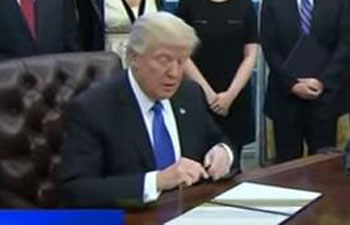by Xinhua writer Cui Yuanlei
MEXICO CITY, Feb. 8 (Xinhua) -- As he crisscrossed Latin America over the past week, U.S. Secretary of State Rex Tillerson tried to drum up support for new oil sanctions on Venezuela.
It is the latest footnote showing that the United States, under President Donald Trump, is trying to turn back the clock on the the country's policy towards the region.
Ahead of his five-nation Latin America tour, Tillerson extolled the Monrone Doctrine in a speech at the University of Texas, saying that the policy, which was born in the age of colonialism and officially put to an end when Barack Obama was U.S. president, is "as relevant today as it was the day it was written" in 1823.
The doctrine was first designed to keep the Europeans out of the region. With such an interventionist policy, the United States has turned Latin America and the Caribbean as its natural sphere of influence. In simpler words, the United States thinks it owns the region.
As a result, Washington has over the decades staged dozens of direct military interventions, blatant coups and secret assassinations in countries like Grenada, Panama, Guatemala, Nicaragua and Haiti to make sure that they did not deviate from its orbit.
Apart from that, economic sanctions and blockade have also been among America's stocks in trade to stifle or even overturn the governments of the regional countries Washington sought to undermine. Tillerson's most recent threat of sanctions against Caracas was another classic example of such maneuvers, and have already faced criticism from countries like Mexico.
While mainly focusing on keeping the Latin American nations in line, Washington has largely brushed over the region. The Trump administration's indifference to area has been even more barefaced, if not the most.
Over the past year, rather than helping with the economic development of the region, the Trump administration has concentrated on blaming the Latin Americans for taking drugs and crimes to the United States, and for taking advantage of U.S. companies in what it called "unfair" trade deals.
While singing the praise for the almost 200-year-old policy before kicking off the visit, the top U.S. diplomat warned against the Latin American countries's growing ties with Moscow and Beijing, calling the two countries "imperialist powers."
Tillerson's assertion is a naked reflection of the Trump administration's backyard thinking of neo-colonialism on its relations with the wider continent.
It has turned a blind eye to a fact that the age of Monroe Doctrine has long gone and a new era of multilateralism is dawning when Latin American countries are entitled to pick whom they intend to trade with and on what kind of terms. They do not need a big brother watching over them from behind.
Therefore, instead of blaming others for its troubled ties with Latin American countries, Washington should revisit its stubborn worship of an obsolete policy, and start to show due respect for its southern neighbors' sovereign rights to choose.













